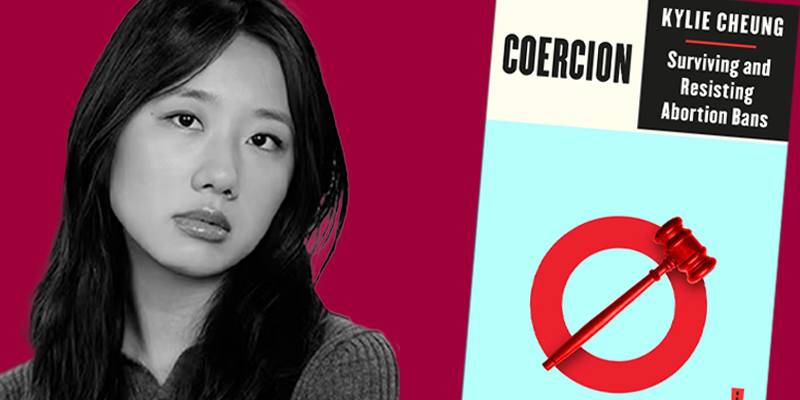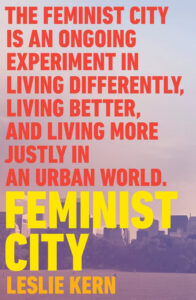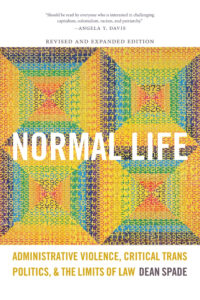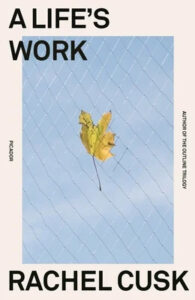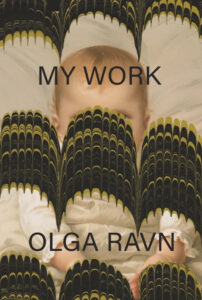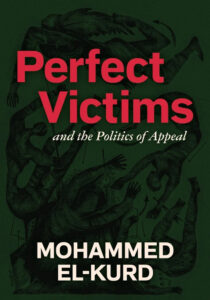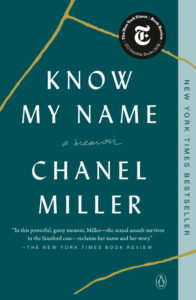July 17, 2025, 2:45pm
Kylie Cheung’s forthcoming book Coercion: Surviving and Resisting Abortion Bans is a searing investigation into the intersecting structures that control the lives of women and pregnant people. In her introduction, Cheung writes that the book “is my best attempt to contextualize the deeper impacts of abortion laws, particularly on endemic gender-based violence in our society.” The book is short but wide ranging, addressing the world post-Dobbs, the criminalization of pregnancy, the ways abusers excert cruelty and control, and how politicians have abandoned and failed vulnerable Americans. As Rita Smith of domesticshelters.org is quoted in the book, “We’re seeing a cultural shift in what the value of women’s lives is.”
Cheung is a reporter for Jessica Valenti’s Abortion, Every Day, and was previously a staff reporter for Jezebel, where she covered a wide variety of issues. I loved Cheung’s news book, and was curious what other writing had inspired Cheung while she was working on Coercion.
“What’s interesting,” she told me, “is the books that I immediately thought of as books that have influenced me weren’t necessarily about abortion or reproductive rights directly.” This is a reflection of how she thinks about abortion, as not “this single issue that exists in a silo” but rather something shaped by a “huge confluence of systems of power.”
In examining abortion and the violence inflicted on women and pregnant people through a wider lens, Cheung told me she was explicitly “challenging this idea that gender-based violence only takes form as interpersonal violence,” and instead “demonstrating how the state itself can be an abuser.” She wanted to write a book “that explicitly takes the position that abortion bans are state violence and that the anti-abortion movement’s position is a fundamentally violent one.”
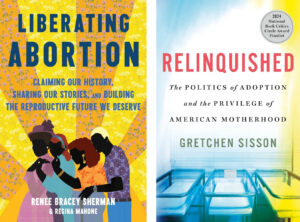
Liberating Abortion by Renee Bracey Sherman and Regina Mahone and Relinquished by Gretchen Sisson
Cheung found inspiration in Liberating Abortion and Relinquished, two books that broadened her thinking about the issues around abortion care and pregnancy.
Relinquished in particular, “really complicates these narratives you’re told where adoption is the alternative to abortion,” Cheung told me. Adoption is not a simple option, especially given an American context where so many people lack resources and support. In practice adoption is not a simple solution, but instead an “emotionally complicated and capitalist industry,” as Cheung put it.
Feminist City: Claiming Space in a Man-Made World by Leslie Kern
In the same vein of thinking more broadly about the structures around anti-abortionists’ desire to control the lives of pregnant people, Cheung recommended Feminist City by the feminist geographer Leslie Kern. The book explores not only how cities fail women through their design, but also offers hopeful solutions by imagining ways we can build more safe, welcoming, and just cities.
“It was just so eye-opening for me,” Cheung said, “how cities and urban planning, public life, and everyday features of life outside of the house are inherently exclusionary toward women and pregnant people and mothers.”
Kern’s emphasis on imagining a better future was something Cheung tries to carry into her own work. “It was inspirational for me,” she said, “to think about building something new, beyond just being critical of things all day.”
Normal Life: Administrative Violence, Critical Trans Politics, and the Limits of Law by Dean Spade
Cheung’s thinking about what solutions might looks like was also inspired by Dean Spade’s book Normal Life, which articulates a forceful challenge to the legal equality framework for social change, and champions more grassroots approaches to justice and safety that go beyond merely seeking state recognition of rights.
Cheung told me that this book came to her at a time, “when I was just starting to have doubts about the Democratic Party and neoliberal identity politics, and this notion that women and queer people and marginalized groups need identity-based representation more than we need redistributional policies” was striking to her.
She was careful to stress that she thinks rights are important, but that thinking of them as the only way forward “coexists with the reality that under that state of things, our needs were not being met and people were being criminalized.” This is a way of thinking that “has so many cracks and fissures where so many different vulnerable people will fall through those cracks,” she said.
Coercion has some forceful critiques of not just the right and the anti-abortion movement in America, but also the ways that “Democrats have failed us while weaponizing fear in really coercive ways,” Cheung said. And while they can’t shoulder the blame completely, or even most of it, “a lot of where we are today is because of Democratic fecklessness or telling people not to dream bigger,” she said.
A Life’s Work by Rachel Cusk
We talked a lot about Rachel Cusk, and how beautiful and attentive her writing is. “It takes me forever to read her books,” Cheung said, “because every other sentence, I’m like, ‘Wow, that’s the most amazing sentence.’”
Cheung singled out A Life’s Work as a “book that really changed my life.” Cusk is “very honest about these things,” Cheung said, “that you’re not supposed to be honest about.”
In A Life’s Work, Cheung “learned so much about the fundamental and almost mundane kind of violence and terror of being pregnant even under the best and most ideal circumstances.”
Coercion is very attentive to these small indignities too. In addition to discussion of policy and statistics, Cheung’s book is full of evocative, searing details. She credits Cusk with illuminating the personal side of what she writes about.
“I’ve just spent so much time reporting on the policies,” Cheung said, “but I think before reading [A Life’s Work], I hadn’t really thought that deeply about how mysterious and unsettling pregnancy can be.”
My Work by Olga Ravn
Another book that reframed how Cheung thought about pregnancy, parenting, and writing was Olga Ravn’s My Work, a novel about a woman who is lost after giving birth and turns to literature to cope.
Becoming a parent is something that “will obviously disrupt your ability to produce or not feel like you’re being selfish when you’re writing,” Chueng said, something that she’s experienced some degree of in her own life, albeit to a much lesser extent: “I already feel that now when I’m not spending enough time with my friends.”
Perfect Victims And the Politics of Appeal by Mohammed El-Kurd
One of the most powerful sections of Coercion explores the overlaps in tactics and motivations between anti-abortion state violence and anti-Palestinian state violence. Cheung talked to me at length about how much she loves Mohammed El-Kurd’s Perfect Victims, his book on Palestinian dignity that weaves together history, personal experience, and reporting. The book, Cheung said, combines El-Kurd’s “brilliant political mind and the moral clarity of his arguments.”
Cheung’s thinking on Palestine and on abortion is linked, she said, and Coercion “is very much about understanding state violence and gender-based violence as conjoined.” The two coercive agendas share a way of seeing the world and operating in it. Cheung told me that she’s “always seen imperialism and Israel’s occupation and genocide of Palestine as similarly co-opting a lot of the tactics of abusers and people who perpetrate gender-based violence.”
El-Kurd describes the ways that Palestinians, like victims of sexual assault, are made to “audition for credibility or humanity.” To be a victim in these contexts is to be “under cross-examination,” Cheung said, “You’re the one who is begging for these basic components of respect and humanity that people, your oppressors, are just born holding.”
Know My Name by Chanel Miller
Chanel Miller’s memoir about her own trauma and transformation was a book that reminded Cheung to not forget the individuals in her writing. Cheung told me about how much she admired Miller’s “brilliance as a storyteller, how funny she is, and the silliness of the book.” Miller’s deeply personal writing struck Cheung too, especially the “very relatable nonlinear nature of her healing.”
Miller’s book is a reminder to be wary of an over reliance on statistics, since “there’s this aspect of humanity that gets in some ways erased when you’re just like, ‘look at all of these horrible statistics.’”
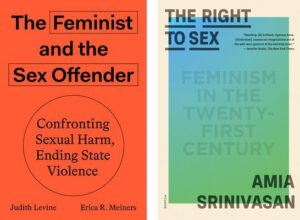
The Feminist and the Sex Offender by Judith Levine and Erica Meiners and The Right to Sex by Amia Srinivasan
Cheung credits both of The Feminist and The Sex Offender and The Right to Sex for challenging her thinking on topics she has covered widely. The Feminist and the Sex Offender in particular made Cheung rethink how the American legal system affects both victims and the accused. “What does justice for them look like?” Cheung told me.
And Srinivasan’s book, “takes on so many daring topics about sex, about violence, about attraction, sex work, sex education, criminalization,” Cheung said, “and presents so many perspectives that are all really compelling and yet often at odds with each other.”
It’s the sort of complex thinking that defies simple explanations, and the kind of writing that Cheung wants to do in her own work. She tries to be incisively “challenging to a lot of preconceived beliefs,” as she put it.
Coercion does just that, asking the reader to consider how the web of different systems and social structures enable more entrapping forms of violence and control. Coercion is a short and direct book, offering an overview of the anti-abortion movement’s ideology of violence, and the scale of the coercive agenda is overwhelming and maddening.
The anti-abortion struggle, Cheung told me, is “a matter of life, whether that’s agency over your life, or the ability to pursue a dignified life, or the ability to escape your abuser, or the ability to survive.” It’s also a matter of death, she said, “with so many material consequences for pregnant people, for victims of domestic violence, for those who have like the least resources under capitalism and white supremacy.”
Cheung’s writing is as clear and decisive as a thunderclap, guided by the force of her convictions and the clarity of her arguments. She’s a writer who knows what she believes, and her prose is undaunted.
“I like how I write,” she told me, “and I think that my anger, and the things that I feel, and the things that I believe, and my outrage really comes through. I don’t know how to write in any other way.”
